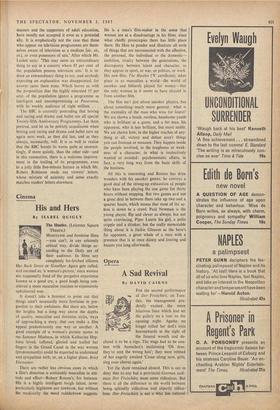Cinema
His and Hers
By ISABEL QUIGLY
MASCULINE and feminine films —you can't, in any solemnly critical way, divide things ac- cording to the likely sex of their audience. In films any completely far-fetched silliness like Back Street or Goodbye Again gets called, and excused as, 'a woman's picture,' since women are supposedly fond of the purgative experience known as a good cry, a good laugh being con- sidered a more masculine reaction to expensively upholstered woe.
It doesn't take a feminist to point out that things aren't necessarily more feminine in pro- portion to their awfulness. But there are, below the heights but a long way above the depths of quality, masculine and feminine styles, ways of approaching a story, that can make a film appeal predominantly one way or another. A good example of a woman's picture seems to me Summer Madness, in which Katharine Hep- burn loved, suffered, gloried and trailed her fingers in the Grand Canal in the way women (predominantly) could be expected to understand and sympathise with; or, on a higher plane, Brief Encounter.
There are rather less obvious cases in which a film's direction is noticeably masculine in atti- tude and effect—Robert Rossen's, for instance. His is a highly intelligent tough talent, never particularly highbrow nor lowbrow, but without the mediocrity the word middlebrow suggests. He is a man's film-maker in the sense that women are at a disadvantage in his films, since what chiefly preoccupies them has little place there. He likes to ponder and illustrate all sorts of things that are unconnected with the affective, the personal, the individual or the domestic— ambition, rivalry between the generations, the discrepancy between talent and character, as they appear in sport, or war, or politics, or work. His new film, The Hustler ('X' certificate), takes place in so masculine a world—the world of snooker and billiards played for money—that the only woman in it seems to have strayed in from another film.
The film isn't just about snooker players, but about something much more general: what is the mentality of the man who wins (or loses)? We are shown a brash, rootless, handsome youth, who is brilliant at a game, and a fat man, his opponent, who is less brilliant, but more stable. We are shown how, in the higher reaches of any- thing at all, victory and defeat aren't things you can forecast or measure. They happen inside the people involved, in the toughness or weak- ness of a character, in what is instinctively wanted or avoided: psychosomatic affairs, in fact, a very long way from the basic skills of the business.
All this is interesting and Rossen has done wonders with his snooker games; he conveys a good deal of the strung-up exhaustion of people who have been playing the one game for thirty hours without stopping. But two games and not a great deal in between them take up two and a quarter hours, which means that most of the ac- tion is down to a crawl. Paul Newman is the young player, flip and clever as always, but not quite convincing, Piper Laurie his girl, a polio cripple and a drinker; but the really memorable thing about it is Jackie Gleason as the hero's fat opponent, a great whale of a man with a presence that is at once dainty and louring and haunts you long afterwards.














































 Previous page
Previous page